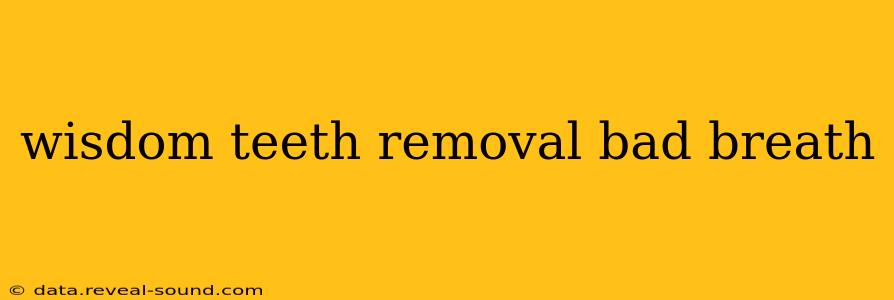Having your wisdom teeth removed is a common procedure, but the recovery process can sometimes be accompanied by unpleasant side effects, one of which is bad breath, or halitosis. Understanding why this happens and how to manage it is crucial for a comfortable recovery. This guide will explore the causes of bad breath after wisdom teeth extraction and offer effective solutions.
Why Do I Have Bad Breath After Wisdom Teeth Removal?
The primary reason for bad breath after wisdom teeth removal is the presence of blood clots and food debris in the extraction sockets. These provide a breeding ground for bacteria, leading to an unpleasant odor. The healing process itself also contributes, as the body works to repair the tissues in your mouth. This can temporarily disrupt the normal balance of bacteria, leading to a temporary increase in halitosis. Additionally, any lingering infection can significantly worsen bad breath.
How Long Does Bad Breath Last After Wisdom Teeth Removal?
The duration of bad breath after wisdom teeth removal varies depending on several factors, including individual healing rates, oral hygiene practices, and the complexity of the surgery. In most cases, it should subside within a week or two as the sockets heal and the inflammation decreases. However, persistent bad breath could indicate an infection, necessitating a follow-up with your oral surgeon or dentist.
What Can I Do to Prevent Bad Breath After Wisdom Teeth Removal?
Preventing bad breath post-surgery is largely about maintaining excellent oral hygiene, which is easier said than done when you're recovering from surgery. Here's a breakdown:
- Gentle Brushing and Rinsing: Start gentle brushing and rinsing as soon as your surgeon or dentist approves. Use a soft-bristled toothbrush and avoid brushing directly over the extraction sites for the first few days. Saltwater rinses are particularly helpful in promoting healing and reducing bacteria.
- Avoid Irritating Foods: Steer clear of foods that can get lodged in the extraction sockets or irritate the healing tissue. This includes hard, crunchy, or spicy foods. Opt for soft, bland foods like soups, smoothies, and yogurt.
- Stay Hydrated: Drinking plenty of water helps to wash away food particles and keep your mouth moist, both crucial factors in preventing bad breath.
- Avoid Smoking and Alcohol: Both smoking and alcohol hinder the healing process and can significantly increase the risk of infection, leading to persistent bad breath.
Is Bad Breath After Wisdom Teeth Removal a Sign of Infection?
While bad breath is a common side effect, persistent or worsening bad breath, especially accompanied by other symptoms like swelling, pain, fever, or pus, could indicate a dry socket or infection. Seek immediate medical attention if you experience these symptoms.
How Can I Get Rid of Bad Breath After Wisdom Teeth Removal?
Beyond the preventative measures, here are some things that can help address existing bad breath:
- Saltwater Rinses: Regularly rinsing your mouth with warm saltwater solution can significantly reduce bacteria and help to keep the extraction sites clean.
- Oral Rinse (as directed by your dentist): Your dentist may prescribe a special antiseptic mouthwash to help control bacteria and promote healing. Use it only as directed.
- Maintaining Good Oral Hygiene: This is paramount, including brushing and flossing gently around the healing sites once the initial healing period is over.
Can Dry Socket Cause Bad Breath?
Yes, a dry socket (alveolar osteitis) can contribute to bad breath. A dry socket occurs when the blood clot in the extraction site dislodges, exposing the underlying bone. This creates a painful and unpleasant situation, often accompanied by a foul odor. If you suspect a dry socket, contact your dentist or oral surgeon immediately.
By understanding the causes and employing the preventive and remedial measures outlined above, you can significantly reduce the chances of experiencing prolonged or severe bad breath after wisdom teeth removal and ensure a smoother recovery. Remember, consistent communication with your dental professional is key to addressing any concerns promptly and effectively.
